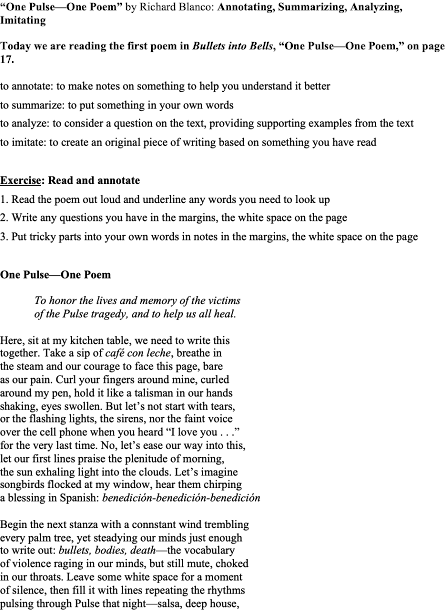Week 48: College Reading and Writing: Mary Oliver
Week 48: College Reading and Writing: Mary Oliver
Mary Oliver: Annotating,
Summarizing, Analyzing, Imitating
to
annotate: to make notes on something to help you understand it better
to
summarize: to put something in your own words
to
analyze: to consider a question on the text, providing supporting examples from
the text
to
imitate: to create an original piece of writing based on something you have
read
Exercise: Read and annotate
1.
Read the poem out loud and underline any words you need to look up
2.
Write any questions you have in the margins, or in your notebook
3.
Put tricky parts into your own words in notes in the margins, or in your
notebook
Exercise: Questions for
Comprehension of the poem
1. Why does the poem start with “[y]ou
do not have to be good” (Oliver)? What’s the effect?
2. What does the speaker say about
“repentance” and “despair” (Oliver)?
3. What “calls to you like the wild
geese” (Oliver)?
Exercise: Summarize the poem
Write a paragraph summarizing the poem
with quotations, in-text citation, and a Work Cited Page.
Example too-short summary, incorporating quotation and
in-text citation:
Brenda Hillman’s poem “The
Family Sells the Family Gun” tells the story of siblings getting rid of their
father’s gun after “his ashes...were lying” (87). The speaker questions what it
means to own and get rid of a gun in America, saying, “[w]e couldn’t take it to
the cops even in my handbag” (Hillman 88).
Work Cited Page (for today’s poem)
Oliver,
Mary. “Wild Geese by Mary Oliver.” Poem
of the Week, Shanendoah, 2018,
https://shenandoahliterary.org/blog/2017/02/upon-asking-the-cashier-at-kroger-to-scan-that-old-tattoo-of-a-barcode-on-my-forearm-by-anna-journey/.
Exercise: Write a Response
What role do the wild geese play in the
poem? Why are they important? What is this poem saying about the human
experience? What does Oliver value? Do you agree with Oliver’s values? Why or
why not?
Exercise: Analysis
Question
for analysis: The poem
begins with declarative statements; what effect does this have on the poem? How
do they add to the meaning of the poem? Does Oliver’s use of nature imagery help to clarify her
point? Why or why not? Closely examine the declarative statements and the
images in this poem, then write an analysis where you explore why you think the poet
balances images and declarative statements.
Exercise: Imitation
Take
your free-write about any animal or animals and turn it into a poem. Add your list of
three declarative statements. Use elements from Oliver’s poem that you admire
to make your own poem stronger.
Homework:
- Summary of Poem
- Write a Response
- Analysis of Poem
- Imitation of Poem
About this class:
Your
notebooks belong to you; you can write first drafts in them, and make notes for
yourselves. To turn in homework, revise your work in a blue book or sheets of
paper you can get from your instructor. In this class, you are welcome to
submit homework for a grade. If it’s not strong enough to earn an A, I’ll give
you some comments to help you revise it, and let you do it over again. You have
as many chances as you want to complete and perfect the work in this class, and
you are welcome to do more than one week’s worksheet for homework at a time;
ask me for sheets you’ve missed. Students who complete 15 weeks of graded
assignments and a longer paper can qualify for college credit. When you get
close to completing 15 weeks, I’ll help you get started on your longer paper.
You do not have to be good.
You do not have to walk on your
knees
For a hundred miles through the
desert, repenting.
You only have to let the soft animal
of your body
love what it loves.
Tell me about despair, yours, and I
will tell you mine.
Meanwhile the world goes on.
Meanwhile the sun and the clear
pebbles of the rain
are moving across the landscapes,
over the prairies and the deep
trees,
the mountain and the rivers.
Meanwhile the wild geese, high in
the clean blue air,
are heading home again.
Whoever you are, no matter how
lonely,
the world offers itself to your
imagination,
calls to you like the wild geese,
harsh and exciting—
over and over announcing your place
in the family of things.


Comments
Post a Comment